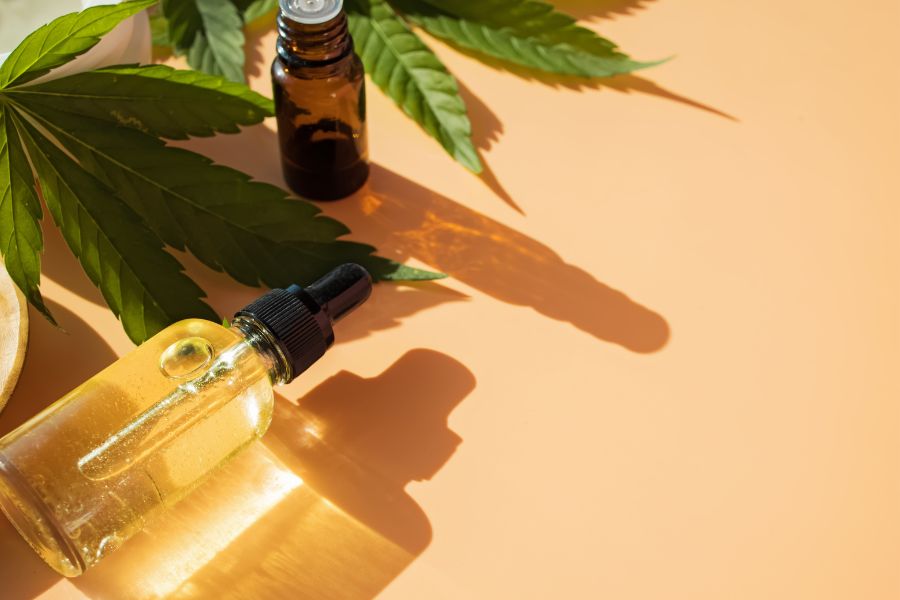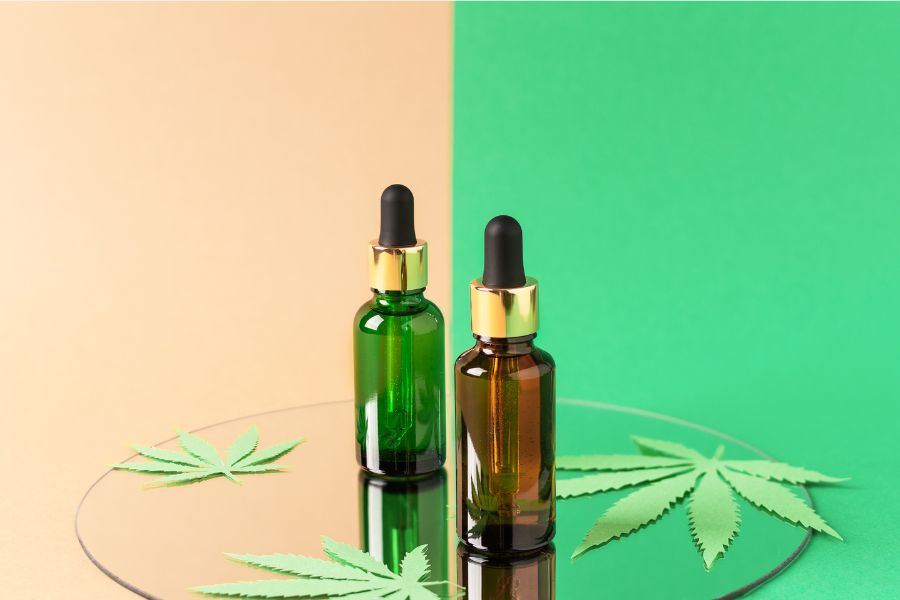Have you ever heard of CBD or Hemp Oil but weren’t sure what the difference was? Maybe you’ve heard stories about CBD’s supposed healing properties or seen it touted as a miracle cure for everything from anxiety to cancer. Further, how is CBD vs THC any different?
Or perhaps you’ve seen Hemp Oil products and wondered if they have any benefit.
The fact is, these two oils have a lot of differences, and understanding them will help you make the right choice for your needs.
Let’s see what sets CBD oil apart from Hemp oil and how each can help improve your overall health and well-being.
What Is CBD Oil?
CBD, short for cannabidiol, is a natural compound extracted from the cannabis plant, terpenes, and essential oils. It’s derived from the resin or flowers of industrial hemp plants.
Unlike marijuana, cannabidiol contains only trace amounts of THC — the compound responsible for hallucinogenic effects. So, it won’t get you high. CBD oil tincture or isolate have carrier oil like MCT or olive oil.
It also offers numerous health benefits, including relief from pain and anxiety, improved skin conditions, better sleep, and reduced joint swelling.
CBD oil may be more effective than other treatments like prescription or over-the-counter medications. That’s because it’s a natural product made into a concentrate with specific medical benefits.
What Are The Benefits Of CBD Oil?
CBD, with the right dosage, has been linked to various health benefits, including reducing inflammation, relieving stress and anxiety, and helping with sleep.
One of the primary benefits of CBD is that it’s non-intoxicating—unlike THC, which can cause a high. This makes CBD appealing to people interested in exploring the potential therapeutic benefits of cannabis without the psychoactive effects associated with THC.
Studies suggest CBD assists with neurodegenerative diseases like Alzheimer’s and Parkinson’s. It also limits pain in people with arthritis and multiple sclerosis.
Additionally, some evidence suggests that CBD treats substance abuse and other mental health issues.
Most importantly, remember that everyone responds differently to treatments. So if you’re considering CBD oil for its potential health benefits, you must talk to your doctor or healthcare provider first.
What Is Hemp Oil?

You may have heard about hemp oil, but what is it exactly? Hemp oil is a compound derived from the Cannabis plant. It’s made by pressing the hemp seeds to extract the oil, which contains compounds like terpenes, essential fatty acids, and cannabinoids like CBD.
It is important to note that hemp oil doesn’t contain CBD, even though it comes from the Cannabis plant. Hemp oil does contain other cannabinoids, like CBC and CBG, but not CBD. You may also find trace amounts of THC in some hemp oil varieties, but it will usually be less than 0.3%.
You may use it in various ways, both internally and externally. For instance, Hemp oil can serve as a cooking oil or a raw nutritional supplement.
Overall, you can always find hemp seed oils at health food stores.
What Are The Benefits Of Hemp Oil?
When it comes to hemp oil, you may be surprised to learn that it’s quite beneficial for you — not just for external issues like skincare but also internally.
Essential Fatty Acids
Hemp oil is rich in essential fatty acids, which our bodies need to stay healthy but cannot naturally produce. This makes it one of the best Omega-3 and Omega-6 fatty acids sources.
A Powerhouse of Nutrition
Both hemp seed oil and CBD oil are packed with benefits. But the former has more than 20 amino and 21 mineral compounds. It’s a natural powerhouse of nutrition with a pleasant flavor, perfect for incorporating into your diet.
So what are some other benefits of hemp oil? Just check out this list:
- Improving heart health by reducing bad cholesterol levels in the blood
- Promoting healthier skin by reducing redness and irritation
- Restoring balance and energy levels in the body
- Helping regulate mood swings and improve mental clarity
- Assisting in relief from pain due to inflammation or arthritis
CBD vs Hemp Oil: How Are They Different?
So, what’s the difference between CBD and hemp oil?
First, they come from different parts of the hemp plant. While hemp-derived CBD oil is extracted from the leaves and flowers of the plant, hemp oil is extracted from the seeds.
This means cannabis-derived CBD oil contains more active compounds than hemp-derived CBD oil.
CBD also has many therapeutic benefits, including pain relief and reducing anxiety. Research has also shown that it can improve sleep quality and ease symptoms of diseases like epilepsy and multiple sclerosis.
On the other hand, hemp oil is typically used in food, skincare products, and supplements — typically for its omega-3 fatty acid content.
To better understand their differences, note that:
- CBD is extracted from flower buds and contains trace amounts of THC — less than 0.3% — whereas hemp contains no THC at all
- Hemp oil often increases total polyunsaturated fatty acids in foods like salad dressings. While CBD oil can be effectively used for its anti-inflammatory benefits
- Hemp seed oil may reduce inflammation while providing key nutrients for overall health. On the flip side, CBD has a wide range of medical benefits
How to Choose Between CBD Oil and Hemp Oil

When considering hemp oil vs. CBD oil, choose a product that fits your lifestyle. So how can you decide which is right for you?
Let’s break it down by comparing the two.
CBD Oil
CBD oil is derived from the buds and flowers of industrial hemp plants and has high levels of cannabidiol (CBD) and low levels of THC (tetrahydrocannabinol). Unlike marijuana, CBD oil won’t get you high. Plus, it alleviates symptoms associated with anxiety, depression, insomnia, pain, inflammation, seizures, and more—all without the psychoactive effects.
Hemp Oil
Hemp oil is extracted from the leaves and stems of the cannabis sativa plant. It’s mainly used for its nutritional benefits, rich in omega-3 fatty acids, vitamins A, D & E.
It’s also great for skin health — taking just a few drops will nourish and protect your skin with antioxidants, amino acids, and essential fatty acids.
Choosing between CBD products and cannabis sativa seed oil will depend on what you want from your product – relief from physical symptoms or just a daily dose of nutrition!
The Legal Status of CBD and Hemp Oil in Canada
Canada is one of the few countries with well-developed regulations around these products, and it’s essential to understand them if you plan on using either.
CBD Oils
Under Canadian law, CBD is considered an all-natural health product and can be sold without a prescription. You do need to ensure that Health Canada has approved the product you are buying.
Hemp Oils
Hemp oil is extracted from cannabis seeds and contains only small amounts of CBD. It’s considered safe for use in food products and other consumer goods. Hemp oil is widely used in the food industry as an additive since it has high levels of proteins and fatty acids like omega 3 & 6 that are good for you! It’s also an environmentally friendly alternative for cooking oils due to its low emissions compared to traditional sources like palm and soybean oil.
Knowing the legal status of each product should help you make informed decisions about using CBD or hemp oil in Canada.
Conclusion
CBD and hemp oil are powerful and versatile substances that relieve various ailments. However, CBD and hemp oil are not the same and work differently in the body.
CBD is derived from hemp oil but is the active ingredient, whereas hemp oil is derived from the hemp seed and contains only trace amounts of CBD.
CBD oil offers many potential health benefits, such as reducing inflammation, relieving pain, and helping with insomnia.
While hemp oil is an excellent source of essential fatty acids and vitamins, is great for skin health, and boosts the immune system.
Ultimately, CBD and hemp oil have unique benefits and can help improve your overall health and well-being. If you’re looking to gift one today, here are some ideas.

